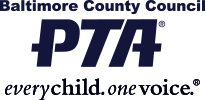TREASURER TRAINING PRESENTATION
- The primary purpose of PTA is not fundraising!
- From National PTA Money Matters: “A PTA renders a greater service by working to secure adequate funding for programs that have a more enduring benefit than purchasing equipment for schools. PTAs should not contribute to the problem of inequities within a school district by excessive fundraising.”
- The National PTA’s Back-to-School Kit has a comprehensive fundraising section. PTA Presidents can register to access the kit here.
- The PTA Fiscal year is July 1 to June 30
- When your PTA files the following, you must send Free State PTA a copy within 30 days of filing and remember to keep copies for your records):
- Copy of financial review: due by October 30
- 990EZ/990N: due by November 15 (send a copy as soon as you file)
- Charitable Registration renewal: due by December 31 (send a copy as soon as you file)
- Personal Property Return: due April 15 (send a copy as soon as you file)
- Watch for Free State finance training.
- Contact treasurer@bcptacouncil.org if you have PTA finance-related questions.
SUNSHINE FUNDS
It’s appropriate, for example, to run a PTA-sponsored Winter Coat Drive because any child can benefit from the program.
“Sunshine Funds” refer to a local PTA unit’s effort to provide assistance to an individual or family in the case of a catastrophic event, such as a fire, or other disaster. While these efforts are extremely well-intentioned and admirable, using the funds of a local PTA for such a cause could result in that local PTA losing their tax-exempt status with the IRS. This is due to the “inurement of benefit rule”:
A section 501(c)(3) organization must not be organized or operated for the benefit of private interests, such as the creator or the creator’s family, shareholders of the organization, other designated individuals, or persons controlled directly or indirectly by such private interests. No part of the net earnings of a section 501(c)(3) organization may inure to the benefit of any private shareholder or individual. A private shareholder or individual is a person having a personal and private interest in the activities of the organization.
However, there are programs that a local PTA can operate to address a need that do not put their tax-exempt status in jeopardy. These programs have to benefit a “class” or group of individuals, rather than a specific person or family.
PROTECTING THE PTA’S FINANCIAL ASSETS
Fiduciary Responsibility:
As a member of the board of directors of an organization (your PTA unit), it is the individual responsibility of each board member to make sure the organization is operating in a fiscally, financially, and legally sound manner.
When an individual becomes a board member, either through election or appointment, that person becomes legally obligated to prudently, properly and responsibly conduct themselves (as an individual), and to be sure the organization conducts itself in a manner so that the best interests of the organization and its members are protected and preserved.
If an individual, as a member of a board, fails to exercise reasonable caution and care, that person is left open, not only to criticism from their peers, but to potential personal liability for financial losses or damages resulting from failure to exercise reasonable care during the term as a board member.
Prevention:
- Update the signature cards at the bank:
- when an individual who is authorized to sign legal documents resigns from the organization, or
- when newly elected officers officially assume their duties, e.g. as of July 1.
- All checks must have TWO signatures
- All PTA mail is sent to the school’s address or PTA USPS mailbox; no PTA mail should ever go to a person’s home address.
- Bank Statements
- IRS form 990
- Personal Property Tax forms
- Sales and use tax forms
- Employer quarterly tax forms
- Monthly Written treasurer’s reports showing expenditures since the last report and comparison with budgeted amounts (and attach a copy of the monthly statement).
- Reports and budget must reflect gross income, not net income.
- Resolve each bank statement and have an officer without signature authority compare the resolved bank statement with the treasurer’s report.
- Establish, in writing, the process for handling PTA funds and which individuals are authorized to handle PTA funds.
- Deposit PTA funds in the PTA bank account immediately upon receipt.
- NEVER sign a blank check.
- Don’t put PTA funds in your school’s safe.
- Use “disbursement request forms”: completed forms should include an approval signature and attached receipts to support the amount of the check requested.
- Pay all bills by check WITH TWO SIGNATURES. This is in accordance to your bylaws.
APPROPRIATE USE OF PTA FUNDS (from Illinois PTA)
Read guidance here.
